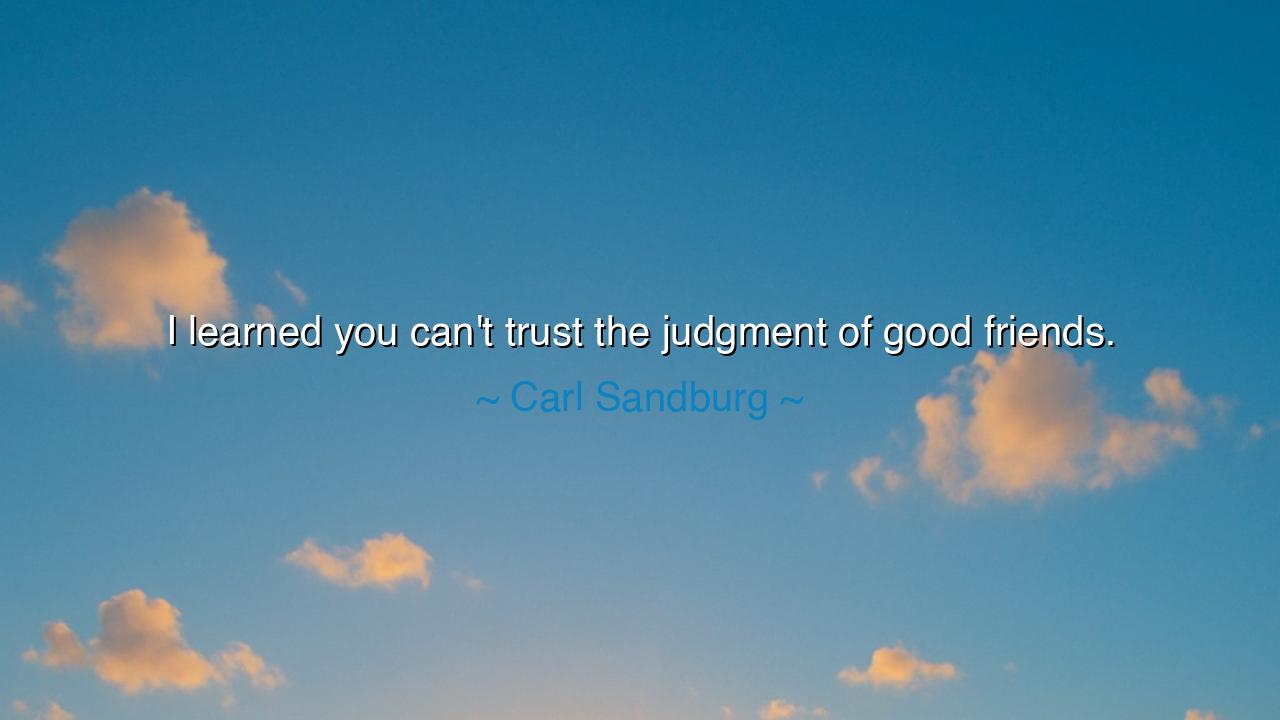
I learned you can't trust the judgment of good friends.






The words of Carl Sandburg—“I learned you can’t trust the judgment of good friends”—sound at first like a paradox, for what is a friend if not one in whom we trust? Yet in this brief and piercing reflection, Sandburg reveals the tender weakness of human affection. A good friend loves us, and because of this love, his judgment is clouded. He sees us not as we truly are, but as he wishes us to be; not with the cold eyes of objectivity, but with the warm glow of loyalty. Thus Sandburg warns us: affection and clarity do not always walk hand in hand.
The origin of this thought comes from Sandburg’s long life as a poet, historian, and observer of the human spirit. He lived among laborers and statesmen, soldiers and dreamers, and he knew the power of friendship. Yet he also knew that the same bond that offers comfort may distort truth. Friends may encourage us when they should correct us, defend us when they should warn us, and praise us when we most need humility. In saying “you can’t trust the judgment of good friends,” Sandburg does not condemn friendship, but reminds us of its limits.
History gives us many vivid examples of this truth. Consider King Lear, who trusted the flattery of those closest to him. His daughters Goneril and Regan spoke with the sweetness of devotion, but their words were poisoned with greed. His truest friend, the loyal Kent, was banished because his words carried honesty rather than blind approval. Lear learned too late that affection—or what masquerades as affection—cannot always be trusted to guide one’s course. So too does Sandburg warn us: even friends may fail in the clarity of their counsel.
Yet there is also a gentler example. Think of Abraham Lincoln, who, though deeply admired by his allies, sought not only their encouragement but also the voices of his critics. He formed a “team of rivals” in his cabinet, because he knew that friends alone might spare his pride but weaken his vision. By surrounding himself with men who would challenge him, not flatter him, Lincoln ensured that the great trials of his presidency were met with truth rather than indulgence. In this, he embodied the wisdom Sandburg spoke: the judgment of friends is precious, but it must be balanced with the harder light of other perspectives.
The meaning of Sandburg’s words is that we must learn discernment. Friendship is a treasure, but it can never replace the necessity of self-examination, nor can it absolve us of the responsibility to seek truth beyond our circle of comfort. A friend may give us encouragement when we need rebuke, or defend our error when we need correction. To lean only on their judgment is to risk walking blind, carried not by truth but by affection.
The lesson for us is clear: value your friends, but do not let their love become your only compass. Seek counsel from those who will tell you the truth, even when it wounds. Balance the sweetness of friendship with the bitter medicine of honesty. And above all, learn to cultivate your own conscience, for no friend, however loyal, can replace the still, quiet voice within that calls you to integrity.
Practically, let us act with both gratitude and vigilance. Be grateful for your good friends, but do not lean wholly upon them in times of decision. Ask for advice, but also weigh it with reason, conscience, and the wisdom of experience. And when you yourself are a friend, strive to give not only comfort but also truth, for true friendship is not measured by agreement, but by the courage to speak what is needed.
Thus, Carl Sandburg’s words endure as a gentle yet powerful warning: “I learned you can’t trust the judgment of good friends.” They remind us that even the most loyal hearts may stumble in clarity, and that wisdom requires us to look beyond affection to the deeper light of truth. Treasure your friends, yes—but let your final guide be conscience, truth, and the eternal call to walk upright in the sight of all men.






AAdministratorAdministrator
Welcome, honored guests. Please leave a comment, we will respond soon